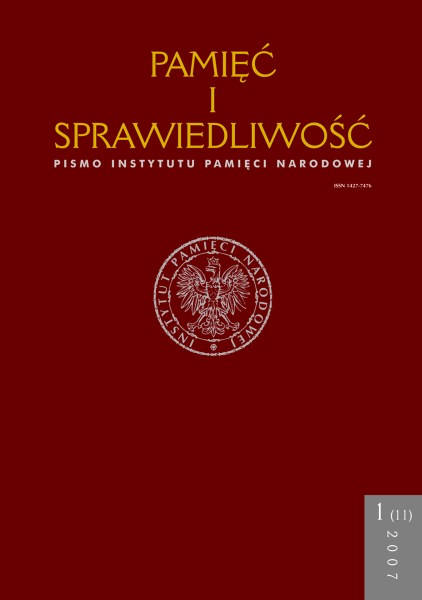Ukraiński Kościół Greckokatolicki wobec konfliktu polsko-ukraińskiego w latach 1939–1946
Pamięć i Sprawiedliwość, Tom 11 Nr 1 (2007), strony: 145-176
Data publikacji: 2007-12-30
Abstrakt
A complicated perspective of mutual relationship of Greek Catholic Church and nationalistic movement in the period of the Second World War was an important factor of international relationships. The problem mentioned above is difficult to examine not only because of existence of various stereotypes, but also because it is diffi cult to establish unambiguous attitude of Greek Catholic Church towards anti-Polish activities and Ukrainian underground. Nevertheless, the difference of attitudes of Greek Catholic Church as a structural unit hit the eye, that is the difference between the offi cial attitude shown by the bishops and the attitude of common clergymen, which also was not unambiguous.
The attitude of the majority of church hierarchy towards Polish-Ukrainian conflict was constructive and aimed at communicating. Activities of Greek Catholic Church in that fi eld sometimes led to tension in contacts between Ukrainian church authorities and Ukrainian underground (SS „Halychyna”, pastoral epistles against murders of Poles and Ukrainians etc.), but they allowed for softening a harsh ethnic and religious conflict. It must be admitted though, that this influence was limited and the main role was played by secular factors.
The urgent need to fi nd solutions to various, sometimes very complicated, dilemma forced a Greek Catholic priest to form his point of view on events and phenomena of the time on the basis of his own world view. Greek Catholic clergymen represented the educated layer of the society, and in some cases they were the only representatives of Ukrainian intellectuals in the country, influencing the shape of national identity of the Ukrainians. Their authority among the Ukrainian people could be envied by many political powers. That is why Ukrainian underground controlled Greek Catholic clergy and sometimes took appropriate measures against priests who defended Poles.
It is also worth to mention that evolution of relationships between Greek Catholic Church and nationalistic underground was strongly infl uenced by first German, and then Soviet policy. During the Second World War these relationships were transformed according to the historical reality of life. These relationships made the diffi cult way from negating the need of existence of radical nationalistic movement to being aware in the last years of the war that the underground became the only hope for the future.
Inne teksty tego samego autora
- Inna Pojizdnyk, Kościół katolicki a Cerkiew greckokatolicka w USRR po II wojnie światowej – droga do współpracy , Pamięć i Sprawiedliwość: Tom 15 Nr 1 (2010)
 Język Polski
Język Polski
 English
English
 Deutsch
Deutsch
 Français (France)
Français (France)
 Italiano
Italiano
 Русский
Русский


 PDF
PDF
